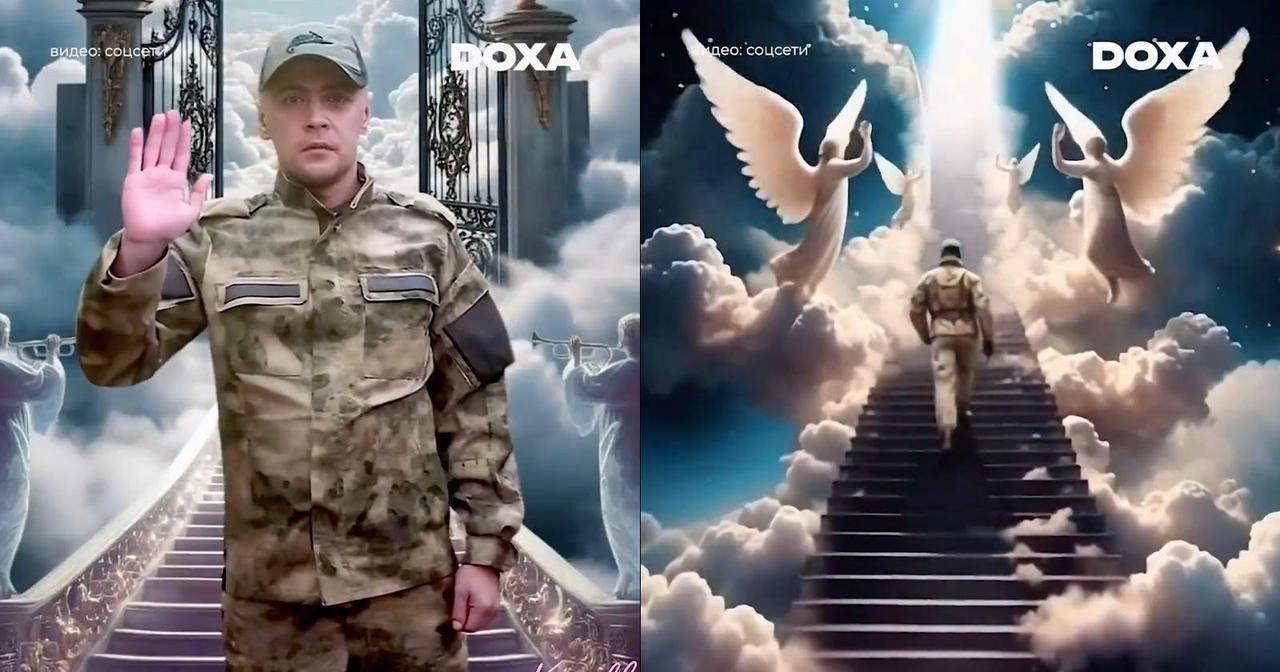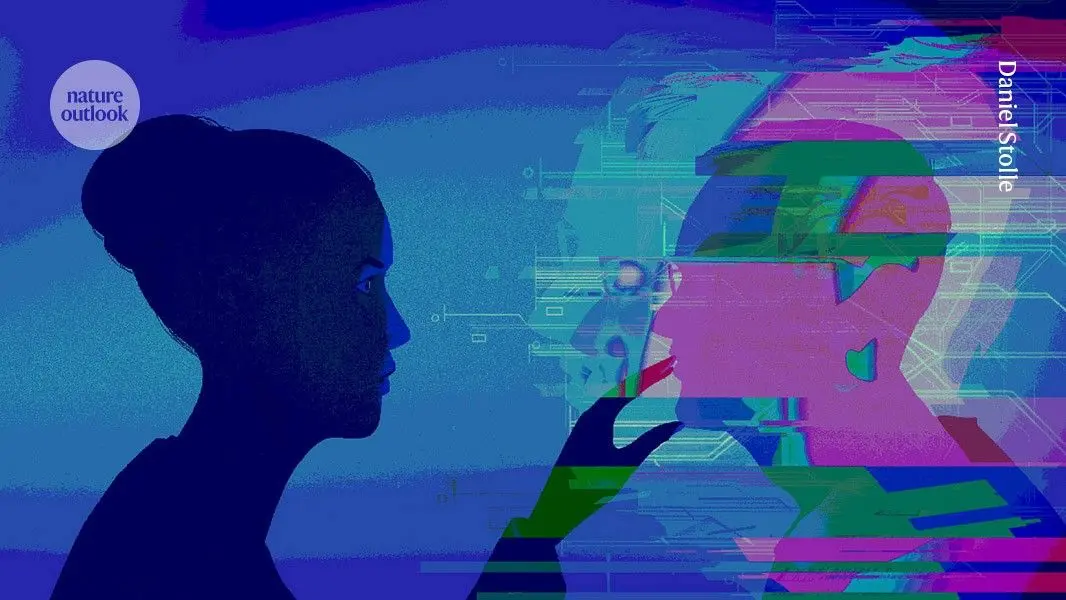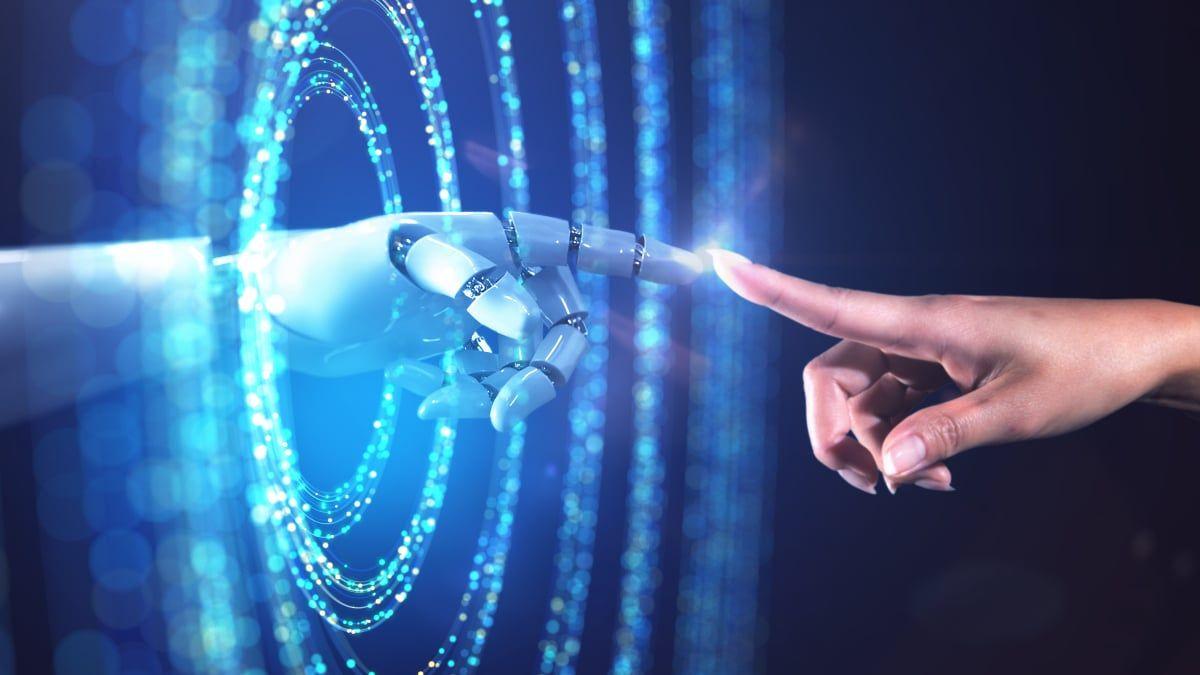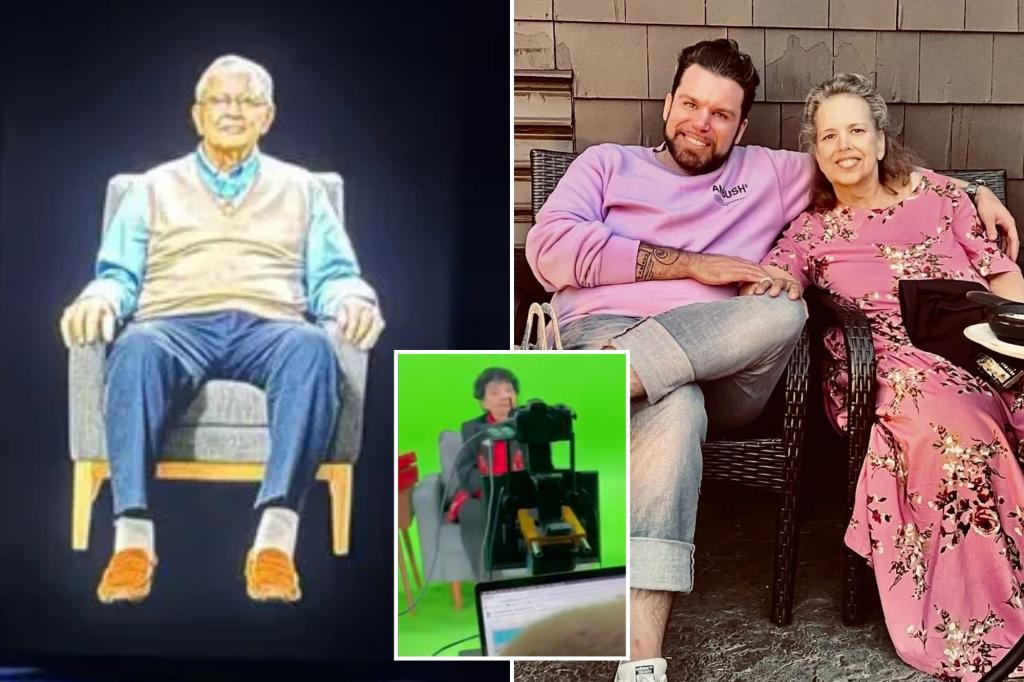AI-Generated 'Digital Resurrections' Offer Closure to Russian War Widows
4 Sources
4 Sources
[1]
AI lets Russian war widows see their soldier husbands one more time
Moscow's Red Square after sunset in 2019. (Alexander Zemlianichenko/AP) A man in a gleaming silver wedding suit presses his lips softly to his bride's. In the next frame, he is clad in military fatigues, climbing a white, curved stairway through gates into the clouds as he waves goodbye. The video is not real and the man in it is long gone: He was a Russian army officer, killed in the summer of 2022 on the Ukrainian front lines. What appears to be his final farewell is in fact a digital apparition generated at the request of his wife by an AI editor using their wedding photos and a few stills of him in uniform. In Russia, artificial intelligence is being used to give the deceased a haunting kind of second life. Social media is rife with short videos of relatives saying goodbye to their dead children, spouses and parents who are resurrected for some 60 seconds -- eyes blinking, lips moving, arms locked in an embrace that never really happened. The trend of "digital resurrection" gained traction in English-speaking corners of the internet this summer, sparking debate about mourning in the digital age. But in Russia the practice carries a darker weight, as the service is especially popular among wives and mothers of soldiers killed during Russia's full-scale invasion of Ukraine over three years ago. Among Ukrainians the videos have evoked blistering criticism on social media from those who see the depiction of Russian soldiers ascending to heaven as a glorification of the very war that has taken their lives and that of many Ukrainians. For about $30, grief-stricken relatives can send a photo of their loved one to an editor on a Telegram bot or a page on VKontakte, Russia's version of Facebook, and receive a short animated clip. For another $30, the dead can speak again through a simulation of their voice adapted from old recordings, to recite scripted farewells. For Yelena Kirghizova, the widow of the officer in the video, the AI-made video was about closure. In an obituary she wrote to accompany the clip, she explained that his body was never returned to the family -- a problem that has long plagued the Russian army, which often fails to track down missing soldiers and leaves relatives searching for answers for months. "For a long time, everything was shrouded in mystery. His body was never returned to us, there was no funeral, no opportunity to say goodbye," Yelena said. She recalled how their son had to give DNA samples twice in the hope of finding a match with remains recovered from the battlefield. "I searched for eyewitnesses and carried out my own investigation to uncover the truth. Only later did I hear from his comrades that Nikita died like a true warrior," she wrote. "His death was painful, but dignified." Anna Korableva, the founder of a VKontakte page called "Final Meeting" that made the trend go viral in Russia, began tinkering with AI about a year ago. At first she made videos of people superimposed into childhood photos so they can appear to meet and embrace their younger selves. In the spring, she received a message from a woman who asked her to create an animation of her embracing her brother who was killed in the war. Korableva did it free in exchange for permission to post it on her page. In two weeks, the clip went viral and orders began pouring in by the hundreds, with up to 500 requests per day. In May, she created the "Final Meeting" page and continues to work through the orders she received that month, while others have to sign up for the waiting list. She described the project as "therapy" that helps people to deal with grief. One video takes her about two days to make, she said, as she interviews the subjects and tries to improve the quality of submitted photos, which is often lacking. The project is taxing, Korableva said, because of both the stories she hears from people who request the videos and the hate messages she said she receives on her pages. "People usually don't value what they have in life enough, they don't say they love each other enough, they don't embrace enough," Korableva said. "From the feedback I get, they feel lighter when they see it on video, they get to talk one more time. I've received a lot of requests from women who said I did not get to say goodbye before [their husband] left, or that they quarreled and then he died." Most clips follow a similar pattern -- a soldier embracing his wife or parents before going to heaven, set to a popular ballad -- but different projects offer add-ons, such as adding angel wings or turning the deceased into white birds flying away. While the vast majority of requests come from mothers and wives of soldiers, the services are not limited to fallen soldiers. Some families have used it to say farewell to beloved pets or deceased parents. In one viral Instagram video that garnered 13 million views, a Russian influencer used black-and-white photos from her 86-year-old grandmother's youth to create a mini-film bringing her long-lost family back to life using a paid Telegram bot that operates on several Western AI models, including GPT-5, Claude, Google Gemini and Perplexity. Much like AI itself, such "resurrection videos" have proved divisive. On Russian social media, some found them unsettling and eerie, while others countered that the videos bring comfort and likened them to medium séances or prayers. People have long used tools like audio and video recordings to preserve the memory of the deceased, so Korableva sees using AI as just another step in the same direction. "I think AI is a powerful tool and it's important to use it responsibly and for good," she said. "I know there are a lot of opinions. I've received a lot of abuse and curses in my private messages ... but I think if these videos help someone, it's worth doing." Natalia Abbakumova contributed to this report.
[2]
Grieving Families in Russia Are Paying $30 to Bring Dead Soldiers Back to Life With AI
Generative AI now makes it possible to breathe new life into still photos -- and in Russia, grieving families are paying $30 for this technology to create ghostly videos of soldiers killed in Ukraine. The process is known as 'digital resurrection.' The Washington Post reports that a growing trend in Russia sees widows handing over wedding photos to AI editors so they can create final farewell videos. They often follow the same format: the solider stands in front of heavenly gates, in the clouds, with a staircase ascending into them. They often are seen hugging their families or saying a farewell, as a Russian ballad plays in the background. Reports put Russian casualties as high as one million since President Vladimir Putin's invasion of Ukraine in 2022. This has left countless devastated parents, wives, and children who often don't know what happened to their loved ones and rarely get their remains for a funeral. So they turn to a Telegram bot of an editor who advertises on VKontakte, a Russian social media website, and hand over photos, videos, and audio recordings of the deceased for a simulated farewell. The AI soldier will repeat a written script, but for talking video clips, the family must pay another $30. The Washington Post spoke to an editor behind the VKontakte page 'Final Meeting' who says it grew naturally from a request by a woman who wanted an AI image of her hugging her brother, who died in Ukraine. She now gets 500 requests per day. However, she also receives a lot of hate mail. Ukrainians have scoffed at the idea of cherub-looking Russian soldiers going to heaven since it is those same soldiers who have wrought death and destruction to Ukraine for the past three years. Even in Russia, the videos are divisive and have been compared to séances. "I think AI is a powerful tool, and it's important to use it responsibly and for good," Anna Korableva, the editor who operates the 'Final Meeting' VKontakte page, tells WaPo. "I know there are a lot of opinions. I've received a lot of abuse and curses in my private messages... but I think if these videos help someone, it's worth doing." Reddit founder Alexis Ohanian used similar technology to create a video clip of him and his Mom -- who died when he was a young boy -- embracing.
[3]
AI is reuniting the living with the departed for one final farewell
AI-generated videos are one of the most controversial things to come out of the generative AI boom. From copyright violations and disinformation to the digital slop-ification of the internet, there is plenty of reason to be wary of. But it seems there are some slivers of hope, too. In Russia, for example, family members are paying more money than an average streaming or AI service to create memorial videos of dead soldiers. The big picture The family members of soldiers who lost their lives in the ongoing conflict with Ukraine are using AI services to create farewell videos depicting them with loved ones. "Using neural networks and careful editing, we recreate the moment of reunion and release them into the heavens," says the advertisement of a Russian company shared on Telegram. Recommended Videos In the videos, the digital recreation of a deceased soldier can be walking the stairs to heaven, hugging a family member, or kissing their partner. The cost of these videos ranges roughly between $20 and $80, depending on the length of the clips and whether you want custom audio, as well. The audio clips are also generated using AI, based on the recordings supplied by friends and family members. "For Yelena Kirghizova, the widow of the officer in the video, the AI-made video was about closure. In an obituary she wrote to accompany the clip, she explained that his body was never returned to the family -- a problem that has long plagued the Russian army, which often fails to track down missing soldiers and leaves relatives searching for answers for months," says a report by The Washington Post. The big shift These farewell videos that are attracting millions of views are tied to a social project called "Final Meeting" on the Russian social media platform VK, or VKontakte. On the more macabre side of things, The Post recently reported how AI facial recognition software was being used to identify dead Russian soldiers. The trend of AI resurrection, however, is not alien. On the contrary, it's a huge trend in China, and many companies, as well as independent creators, are making a bank out of the demand. In China, companies such as Silicon Intelligence are getting increasingly popular for offering services where pictures of the deceased or aging family members are animated using AI to create moving digital mosaics or short clips. In some cases, however, family members and loved ones are also looking for company. To that end, they are paying companies to create an AI chatbot or digital avatar based on the memory and characteristics of a certain person. The scientific community has referred to this techno-cultural shift as "deadbots" and has raised alarms about their risks, as well.
[4]
AI lets Russian war widows see their soldier husbands one more time
A man in a gleaming silver wedding suit presses his lips softly to his bride's. In the next frame, he is clad in military fatigues, climbing a white, curved stairway through gates into the clouds as he waves goodbye. The video is not real and the man in it is long gone: He was a Russian army officer, killed in the summer of 2022 on the Ukrainian front lines. What appears to be his final farewell is in fact a digital apparition generated at the request of his wife by an AI editor using their wedding photos and a few stills of him in uniform. In Russia, artificial intelligence is being used to give the deceased a haunting kind of second life. Social media is rife with short videos of relatives saying goodbye to their dead children, spouses and parents who are resurrected for some 60 seconds - eyes blinking, lips moving, arms locked in an embrace that never really happened. The trend of "digital resurrection" gained traction in English-speaking corners of the internet this summer, sparking debate about mourning in the digital age. But in Russia the practice carries a darker weight, as the service is especially popular among wives and mothers of soldiers killed during Russia's full-scale invasion of Ukraine over three years ago. Among Ukrainians the videos have evoked blistering criticism on social media from those who see the depiction of Russian soldiers ascending to heaven as a glorification of the very war that has taken their lives and that of many Ukrainians. For about $30, grief-stricken relatives can send a photo of their loved one to an editor on a Telegram bot or a page on VKontakte, Russia's version of Facebook, and receive a short animated clip. For another $30, the dead can speak again through a simulation of their voice adapted from old recordings, to recite scripted farewells. For Yelena Kirghizova, the widow of the officer in the video, the AI-made video was about closure. In an obituary she wrote to accompany the clip, she explained that his body was never returned to the family - a problem that has long plagued the Russian army, which often fails to track down missing soldiers and leaves relatives searching for answers for months. "For a long time, everything was shrouded in mystery. His body was never returned to us, there was no funeral, no opportunity to say goodbye," Yelena said. She recalled how their son had to give DNA samples twice in the hope of finding a match with remains recovered from the battlefield. "I searched for eyewitnesses and carried out my own investigation to uncover the truth," she wrote. Anna Korableva, the founder of a VKontakte page called "Final Meeting" that made the trend go viral in Russia, began tinkering with AI about a year ago. At first she made videos of people superimposed into childhood photos so they can appear to meet and embrace their younger selves. In the spring, she received a message from a woman who asked her to create an animation of her embracing her brother who was killed in the war. Korableva did it free in exchange for permission to post it on her page. In two weeks, the clip went viral and orders began pouring in by the hundreds, with up to 500 requests per day. In May, she created the "Final Meeting" page and continues to work through the orders she received that month, while others have to sign up for the waiting list. She described the project as "therapy" that helps people to deal with grief. One video takes her about two days to make, she said, as she interviews the subjects and tries to improve the quality of submitted photos, which is often lacking. The project is taxing, Korableva said, because of both the stories she hears from people who request the videos and the hate messages she said she receives on her pages. "People usually don't value what they have in life enough, they don't say they love each other enough, they don't embrace enough," Korableva said. "From the feedback I get, they feel lighter when they see it on video, they get to talk one more time. I've received a lot of requests from women who said I did not get to say goodbye before [their husband] left, or that they quarreled and then he died." Most clips follow a similar pattern - a soldier embracing his wife or parents before going to heaven, set to a popular ballad - but different projects offer add-ons, such as adding angel wings or turning the deceased into white birds flying away. While the vast majority of requests come from mothers and wives of soldiers, the services are not limited to fallen soldiers. Some families have used it to say farewell to beloved pets or deceased parents. In one viral Instagram video that garnered 13 million views, a Russian influencer used black-and-white photos from her 86-year-old grandmother's youth to create a mini-film bringing her long-lost family back to life using a paid Telegram bot that operates on several Western AI models, including GPT-5, Claude, Google Gemini and Perplexity. Much like AI itself, such "resurrection videos" have proved divisive. On Russian social media, some found them unsettling and eerie, while others countered that the videos bring comfort and likened them to medium séances or prayers. People have long used tools like audio and video recordings to preserve the memory of the deceased, so Korableva sees using AI as just another step in the same direction. "I think AI is a powerful tool and it's important to use it responsibly and for good," she said. "I know there are a lot of opinions. I've received a lot of abuse and curses in my private messages ... but I think if these videos help someone, it's worth doing." - - - Natalia Abbakumova contributed to this report.
Share
Share
Copy Link
A new trend in Russia uses AI to create farewell videos of deceased soldiers, allowing grieving families to see their loved ones one last time. This practice, known as 'digital resurrection', has gained popularity but also sparked controversy.
The Rise of 'Digital Resurrection' in Russia
In a poignant intersection of grief and technology, a new trend has emerged in Russia: the use of artificial intelligence to create 'digital resurrections' of deceased soldiers. This practice has gained significant traction, particularly among families of soldiers who lost their lives in the ongoing conflict with Ukraine
1
.For a modest fee of around $30, grieving relatives can submit photos of their loved ones to AI editors on platforms like Telegram or VKontakte (Russia's equivalent of Facebook). These editors then generate short, animated video clips that bring the deceased back to life for about 60 seconds
2
.The Process and Its Appeal
The AI-generated videos typically follow a similar pattern: the deceased soldier is often depicted embracing family members or ascending a stairway to heaven, set against a backdrop of clouds and accompanied by emotive Russian ballads. For an additional $30, families can even have the AI simulate the voice of their lost loved one, reciting scripted farewells based on old recordings
1
.
Source: Digital Trends
Anna Korableva, the founder of the popular VKontakte page 'Final Meeting', describes the project as a form of therapy that helps people cope with grief. She receives up to 500 requests per day, highlighting the significant demand for this service
3
.The Impact on Grieving Families
For many families, these AI-generated videos offer a sense of closure, especially in cases where bodies were never returned or proper funerals couldn't be held. Yelena Kirghizova, the widow of a Russian army officer killed in Ukraine, found solace in such a video. She explained, 'For a long time, everything was shrouded in mystery. His body was never returned to us, there was no funeral, no opportunity to say goodbye'
4
.
Source: PetaPixel
Related Stories
Controversy and Ethical Concerns
While many find comfort in these digital farewells, the practice has also sparked controversy. Critics, particularly Ukrainians, view the depiction of Russian soldiers ascending to heaven as a glorification of the war that has claimed countless lives on both sides
1
.The trend raises important ethical questions about the use of AI in the mourning process and the potential psychological impacts of these digital resurrections. Some compare the practice to séances, blurring the lines between technology and the supernatural
2
.Broader Implications and Future Trends
The phenomenon of 'digital resurrection' is not unique to Russia. Similar services are gaining popularity in China, where companies like Silicon Intelligence offer AI-generated animations of deceased or aging family members
3
.As AI technology continues to advance, the creation of 'deadbots' – AI chatbots or digital avatars based on the memories and characteristics of deceased individuals – is becoming a reality. This development has prompted concerns within the scientific community about the potential risks and long-term societal impacts of such technology
3
.References
Summarized by
Navi
[1]
[3]
[4]
Related Stories
Recent Highlights
1
Google Gemini 3.1 Pro doubles reasoning score, beats rivals in key AI benchmarks
Technology

2
ByteDance's Seedance 2.0 AI video generator triggers copyright infringement battle with Hollywood
Policy and Regulation

3
ChatGPT cracks decades-old gluon amplitude puzzle, marking AI's first major theoretical physics win
Science and Research








